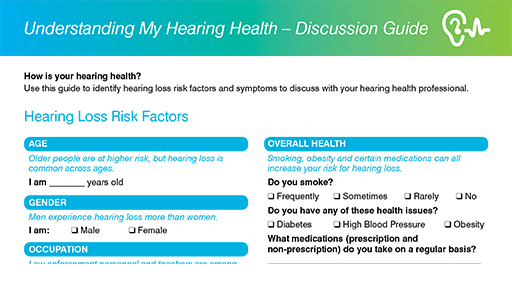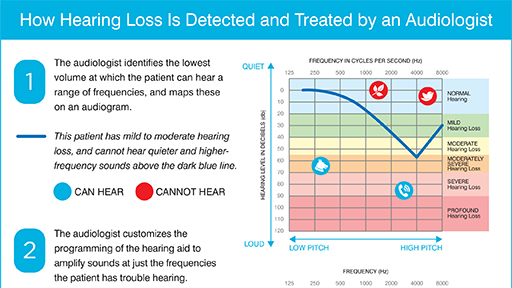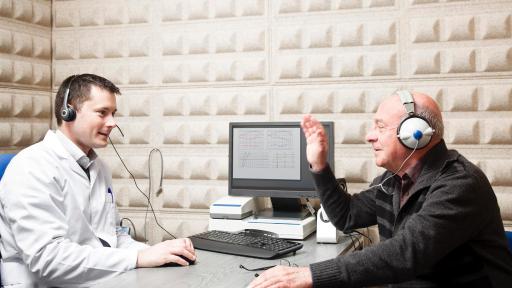Listen Up During Better Hearing Month: Healthy Hearing Habits Lag Behind Dental and Vision
Less Than One in Four Americans Have Checked Their Hearing in the Past Two Years
PR Newswire, POMONA, Calif., May. 5, 2016
While regular visits to the eye doctor and dentist are mainstays of preventive healthcare, less than one in four Americans have had their hearing checked in the past two years, according to a consumer survey by Wakefield Research on behalf of EPIC Hearing Healthcare (EPIC).i And, while most people with poor vision own glasses or contacts to help them see better, only one in five people who could benefit from a hearing aid wears one.ii
“A lot of people aren’t aware how important preventive care is for their hearing health,” said William M. Luxford, M.D., medical director, House Clinic. “Regular, comprehensive hearing exams by an audiologist are the best way to establish a baseline for your hearing and ensure any hearing loss is caught early so further damage can be prevented or minimized and hearing can be improved as quickly as possible.”
According to Luxford, when people do not treat hearing loss, they do things like turn up the television, which can worsen the problem. Difficulty communicating to loved ones, family and co-workers can lead to social issues and isolation, which may discourage seeking treatment. Early intervention – usually by being fit with the right hearing aids to enhance hearing before lifestyles are altered – can prevent this decline.

Hearing and Wellness
One reason people may not be prioritizing their hearing is that they are not in tune with the many ways overall health impacts hearing health, and vice versa. According to EPIC’s survey, only 22 percent of Americans know that having diabetes increases your risk of hearing loss and only 14 percent know that smoking is a risk factor.
Additionally, according to the Better Hearing Institute, studies have linked untreated hearing loss with higher rates of depression, impaired memory, diminished overall health, and increased risk to personal safety.iii Studies from Johns Hopkins University have found links between hearing loss, cognitive decline and dementia.iv
“Despite all the compelling reasons why treating hearing loss is important for public health, hearing wellness has not been consistently recognized as a health care priority,” said Brad Volkmer, president and CEO, EPIC. “In fact, hearing aids often are not covered through general medical insurance, and hearing health is absent from 92 percent of employee wellness programs.”
To help educate consumers about their hearing loss risks while providing them the opportunity to earn discounts on hearing health services, EPIC Hearing Healthcare recently introduced Listen Hear! Live Well, a turnkey hearing health wellness program that can stand alone or be integrated into an employer’s existing wellness efforts. The program is available free-of-charge through EPIC’s Listen Hear! public education initiative.
By completing four fun and educational activities at ListenHearLiveWell.com, participants earn a discount on hearing treatments. They can save even more (30-60 percent) by purchasing through the EPIC network or by participating in an EPIC hearing health plan already in the marketplace through their employer.
The Listen Hear! Live Well program prompts participants to watch an educational video, test their knowledge through an online quiz, take an online hearing assessment and even have the opportunity to experience the different stages of hearing loss and hearing loss treatment technology with virtual simulation. After completing all four activities, participants are e-mailed their coupon code for an extra $50 off standard level hearing aids, $100 off advanced level hearing aids and $200 off premium level hearing aids.“A lot of people think hearing loss isn’t an issue for them – it’s only for people who are older,” said Volkmer. “But our research shows that 30 percent of people across age groups suspect hearing loss and have not sought treatment, and that diagnosed hearing loss is actually slightly more common among younger workers than older ones.”
Talk to Your Audiologist
The Listen Hear! Live Well program includes a free, downloadable discussion guide for “Understanding My Hearing Health,” which can be used to identify hearing loss risk factors and symptoms to discuss with a hearing health professional. The guide reviews risks according to age, gender, occupation, heredity, overall health and noise exposure. It also has a checklist for symptoms of hearing loss.
More information is available at www.ListenHearLiveWell.com.
ABOUT EPIC HEARING HEALTHCARE
Founded in 1997, EPIC Hearing Healthcare (EPIC) is the first in the country to provide access to hearing care as an ancillary or specialty benefit. With its extensive network of audiologists and hearing healthcare physicians, and distribution relationships with major hearing aid technology manufacturers, EPIC is now the national leader in hearing healthcare, and the only organization to offer hearing coverage as a fully insured benefit plan. More information is available at EPICHearing.com.
# # #
Contact
Susan English
Havas PR
412.512.6547
[email protected]
Dru Coleman
EPIC Hearing Healthcare
909.718.8412
[email protected]
i Online employee survey conducted by Wakefield Research on behalf of EPIC Hearing Healthcare between November 22 and December 13, 2013, among 1,500 nationally representative full-time employed Americans 18+.
ii Statistics and Epidemiology. (2010). Quick statistics. Retrieved from National Institute on Deafness and other Communication Disorders (NIDCD) website on January 2, 2014 http://www.nidcd.nih.gov/health/
statistics/Pages/quick.aspx.
iii Hearingpedia. (n.d.). Consequences of Hearing Loss. Retrieved from Better Hearing Institute website on January 23, 2014
http://www.betterhearing.org/hearing_loss/
consequences_of_hearing_loss/index.cfm.
ivAnderson, P. (2013, January). Hearing Loss Linked to Cognitive Decline. Medscape. Retrieved from http://www.medscape.com/
viewarticle/778028.
Listen Up During #BetterHearingMonth! @EPIC_Hearing Educates Consumers About Hearing Loss Risks Tweet






